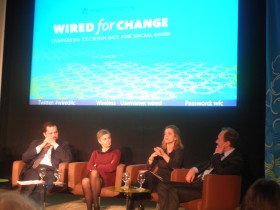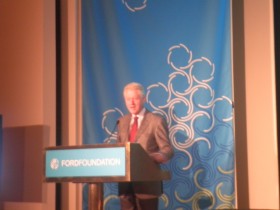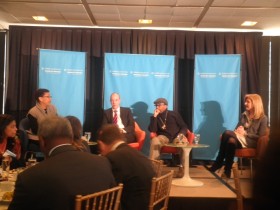This past Wednesday (16 February), the Ford Foundation sponsored “Wired for Change“, a gathering of leaders from foundations, civil society, technology and media to discuss the societal value of the Web*, threats to the Web, and what might be done to expand the value of a free and open Web in the future. Web Foundation founder and Web inventor Tim Berners-Lee, WF Chair and Knight Foundation CEO Alberto Ibargüen and I were fortunate enough to be invited to participate in the conversation.
During the opening panel, moderator Omar Wasow guided Tim (see picture of the “Founding Father”) , Ben Jealous (NAACP), Robin Chase (Zip Car), Yvette Alberdingk Thijm (Witness) through an exploration of the Web access as a fundamental human right. Points that I took away from this sessions and the event as a whole include:
- A free and open Web has brought incredible power to those with access, and could provide comparatively more to the 75% of the Earth’s population who do not yet use it. The Web expands opportunities for expression, collaboration, innovation, social good (including human rights), commerce and access to information (from the life-critical to the simply entertaining).
- The Web is a multiplier. An example that Tim mentioned: Water is a scare commodity and the Web cannot drill a water well. However, information on how to drill water wells could be communicated via the Web to billions of people.
- A free and open Web does not exist everywhere (anywhere?) and is under increasing threat, including within the US.
- All Web users must be better informed and more actively and collaboratively engaged to address those threats and build a better Web for all people in the future. Action at all levels — public, corporate, and government — is required.
- There is optimism for the future. Tim said the the crowd-sourced responses, such as near-real-time updating of maps in Haiti after last year’s earthquake, give him hope. I find optimism in the Web Foundation initial work to stimulate development of valuable content in low-income countries (see WF’s projects).
Each session featured a creative combination of panelists from across a broad spectrum of experiences. The complete program is on the Web, as is the real-time Tweeting by Jillian York, and a suite of imagery. Former US President Bill Clinton gave a surprise talk that captivated all participants for more than an hour. President Clinton noted that he sent only two emails during his presidency (one to US soldiers in Kosovo, and one to then 77-year0ld John Glenn in orbit), and that there were only about 50 Web sites when he was elected in 1992. The lunch panel, hosted by Michel Martin from National Public Radio, and featured Anthony Romero, Spike Lee, Arianna Huffington discussing the topic, “Whose Internet is it Anyway?”.
Congratulations to Ford Foundation President Luis Ubiñas and his colleagues for organizing a thought-provoking event. This event must now become a basis for action. The Web Foundation will use this event and the new friends to catalyze our discussions on how we could more actively to “Web Rights”work around the world.
* I use “Web” here, but clearly, the topics covered are at the Internet, Web, legal and other levels.
http://www.fordfoundation.org/pdfs/news/WFC_program.pdf




Leave a Reply
You must be logged in to post a comment.